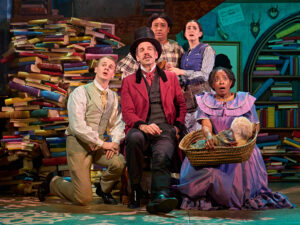Plenty of fun but not enough steam
★★★

Whether or not you’ve read any Dickens or heard the BBC Radio 4 comedy Bleak Expectations, you’ll find plenty to keep you amused in this send-up of Dickens’ novels and of Victorian values.
Theatre Reviews with Paul Seven
Reviews of stage shows and features on theatre
★★★

Whether or not you’ve read any Dickens or heard the BBC Radio 4 comedy Bleak Expectations, you’ll find plenty to keep you amused in this send-up of Dickens’ novels and of Victorian values.
★★

It’s hard to describe how disappointed I was by my visit to the Menier Chocolate Factory to see The Sex Party. In the past, I have laughed at and thoroughly enjoyed plays by Terry Johnson, from Insignificance and Dead Funny to the recent Prism, but The Sex Party, both written and directed by Mr Johnson, turns out to be a very po-faced comedy.
There’s no sex and not much partying. But that’s not why I was disappointed. I fully expected Terry Johnson to be dissecting the party-goers rather than, metaphorically, taking off his undies and joining in. It had hints of the play it could been, one that used laughter to skewer middle-class liberal hypocrisy, and provoked thoughts about gender and sexuality. Instead, The Sex Party is so sensitive about doing and saying the right thing, all the light-heartedness has been sucked out of it.
At every turn, something else is thrown in to expose the limits of the apparent libertarianism of the people who are taking part in this orgy. So thick and fast do they come, that you hardly have time to consider the implications of one point, before we move on to the next one, until you wonder how much more will be loaded onto the ship before it sinks. Add to which, the play’s characters are just too lightweight to carry its heavyweight themes.
The play is entirely set in Tim Shortall’s naturalistic set which wonderfully recreates a kitchen in affluent Islington. Now, I know it’s not unusual for people at a party to gather in the kitchen, but there was meant to be an orgy taking place. That was through the door to the right. There was also a door to the left leading into the garden. A perfect set-up for a French farce, you might think. Think again. No, this is about what happens in the kitchen.
That’s where we meet all the couples. That’s where we learn about their relationships, and what happens when sexual permissiveness puts those relationships to the test. And that’s not the only trial these party-goers face.

So, couples start to arrive. The host Alex is friendly and organised but somewhat world-weary and dissatisfied- and reluctant to leave the kitchen. Jason Merrells is very good at portraying that point when a mature man is going from craggy to seedy. His much younger partner Hetty, played by Molly Osborne, is bright-eyed and bushy-tailed and looking forward to lots of sex with lots of men. Jake and Gilly, played by John Hopkins and Lisa Dwan, are first timers and are there to watch and maybe have sex with each other, but not with anybody else. However, it seems Gilly is keener to experiment than uptight Jake, but she needs a lot of alcohol, as do most of the characters.
In an interview with Terry Johnson in the programme, he talks of the need to get a big laugh in early, so the audience knows it’s a ‘laughing audience’. The play succeeds in that respect when Gilly says that her safe words during sex are ‘Don’t stop’.
Other couples- and more very good actors- follow. Jeff is played by the great Timothy Hutton. What a coup to get this Oscar-winning film actor and splendid stage performer to make his London debut in this play. His character is , and Mr Hutton is magnificent in the role of a rich, right-wing American. He and his plain talking Russian wife Magdalena, played with a heavy accent by Amanda Ryan, are both experienced partygoers. The insults this couple throw at each other certainly liven up the evening, but then, insulting each other turns out to be par for the course for all the guests.
The final couple are Tim, high on drugs, and Camilla, an uptight radical feminist, played by Boris Johnson lookalike Will Barton and Kelly Price. I don’t think we ever find out what they have in common, except perhaps that he likes to be dominated and she likes to have the keys to the cage.
So, they’re there to take part in an orgy. But we’re not. It’s clear we’re not here to be titillated, nor to exploit these actors. There’s no sex going on in the kitchen: a little bit of kissing, but no other physical contact. And, whatever might be going on elsewhere, there’s no nudity. The women do wear lingerie, and two of the men bare their chests, but that’s the extent of it. This is a serious comedy.
A major problem with this play is that, with the possible exception of the host Alex, all these characters are caricatures. They all seem like they’re from a 1960s bedroom farce. I suspect this is a deliberate ploy by Terry Johnson, so that our expectations can be eventually confounded. The difficulty is, when it seems like they’re only there for the laughs, it is extremely hard to believe in them, or their situations.
Act One seems to go round in circles, arriving again and again at the same question of will they, won’t they do whatever it is they are arguing about doing, or not doing.

Then at the end of act one, the arrival of Lucy, a single person, changes everything, because Lucy is a trans woman. And to the great credit of the production, she is played by a trans woman Pooya Mohseni, who is an excellent actor and brings elegance and sensitivity to the role. So act two resumes with the gang cross-examining Lucy but soon the situation is reversed as the play explores the attitude of these heterosexual cis men and women’s toward sex with a trans woman. The limits of their liberal views are severely tested.
In that interview I mentioned, Mr Johnson says: ‘ Everyone is very careful now. I was full of resentment about it before I took this play on. But I’ve had to adjust to a whole new vocabulary and attitudes.’ Well, he certainly has. The play feels sanitised. Even innuendoes are given short shrift. I understand that many sexual jokes that once had people rolling in the aisles may now be considered offensive, but good comedy is grounded in the world as it is, not as we’d like it to be. I find it hard to believe that a largely middle-aged and often nervous set of people at a sex party wouldn’t have made the occasional double-entendre. Still, perhaps we should be thankful that we were spared the ‘thank you for coming’, ‘thank you for having me’ kind of humour.
I think The Sex Party could have worked well as a play, if it had been less concerned about causing offence, and if it hadn’t tried to shoehorn every gender and sexuality issue you can think of into its two-and-a-bit hours. I’m exaggerating, of course, but here are a few examples: a reference to trans women competing in women’s sport events is lobbed in and batted out within seconds; there’s an interesting but fleeting moment when it’s suggested that although the women appear to be enjoying the freedom of choosing their lovers, the men may still be calling the shots; someone reads out a list of the many genders we can identify with in our modern world that is so tedious, the play loses all momentum. By the time two more serious incidents occurred, instead of taking in the implications of them, I was wondering how much more would be stacked on and taken away from this Jenga of a play.
It also ties itself in knots. There’s a moment in the first act, a kind of precursor to the transgender debate of the second act, when it’s pointed out there are no black people at the party. I thought this could have been explored further but the play moved on, leaving me, at least, to ponder the irony that there are no black actors in the cast.
Every so often there were noises off in the form of loud bangs. I know it was probably a loose door but I couldn’t help wondering if it was the sound of so many half-baked ideas clunking to the floor.
The Sex Party can be seen at the Menier Chocolate Factory until 7 Jnuary 2023
Click here to watch this review on our YouTube channel Theatre Reviews With Paul Seven